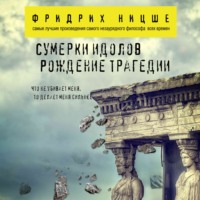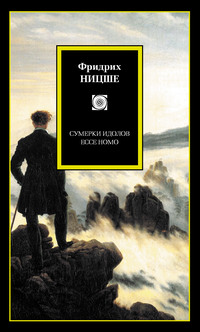 полная версия
полная версияThe Dawn of Day
This type of courage, which is not far removed from excessive generosity, has been lacking in humanity up to the present. – Oh, that our poets might once again become what they once were: seers, telling us something about what might possibly happen! now that what is real and what is past are being ever more and more taken from them, and must continue to be taken from them – for the time of innocent counterfeiting is at an end! Let them try to enable us to anticipate future virtues, or virtues that will never be found on earth, although they may exist somewhere in the world! – purple-glowing constellations and whole Milky Ways of the beautiful! Where are ye, ye astronomers of the ideal?
552
Ideal Selfishness. – Is there a more sacred state than that of pregnancy? To perform every one of our actions in the silent conviction that in one way or another it will be to the benefit of that which is being generated within us – that it must augment its mysterious value, the very thought of which fills us with rapture? At such a time we refrain from many things without having to force ourselves to do so: we suppress the angry word, we grasp the hand forgivingly; our child must be born from all that is best and gentlest. We shun our own harshness and brusqueness in case it should instil a drop of unhappiness into the cup of the beloved unknown. Everything is veiled, ominous; we know nothing about what is going on, but simply wait and try to be prepared. During this time, too, we experience a pure and purifying feeling of profound irresponsibility, similar to that felt by a spectator before a drawn curtain; it is growing, it is coming to light; we have nothing to do with determining its value, or the hour of its arrival. We are thrown back altogether upon indirect, beneficent and defensive influences. “Something greater than we are is growing here” – such is our most secret hope: we prepare everything with a view to his birth and prosperity – not merely everything that is useful, but also the noblest gifts of our souls.
We should, and can, live under the influence of such a blessed inspiration! Whether what we are looking forward to is a thought or a deed, our relationship to every essential achievement is none other than that of pregnancy, and all our vainglorious boasting about “willing” and “creating” should be cast to the winds! True and ideal selfishness consists in always watching over and restraining the soul, so that our productiveness may come to a beautiful termination. Thus in this indirect manner we must provide for and watch over the good of all; and the frame of mind, the mood in which we live, is a kind of soothing oil which spreads far around us on the restless souls. – Still, these pregnant ones are funny people! let us therefore dare to be funny also, and not reproach others if they must be the same. And even when this phenomenon becomes dangerous and evil we must not show less respect to that which is generating within us or others than ordinary worldly justice, which does not allow the judge or the hangman to interfere with a pregnant woman.
553
Circuitous Routes. – Where does all this philosophy mean to end with its circuitous routes? Does it do more than transpose into reason, so to speak, a continuous and strong impulse – a craving for a mild sun, a bright and bracing atmosphere, southern plants, sea breezes, short meals of meat, eggs, and fruit, hot water to drink, quiet walks for days at a time, little talking, rare and cautious reading, living alone, pure, simple, and almost soldier-like habits – a craving, in short, for all things which are suited to my own personal taste? a philosophy which is in the main the instinct for a personal regimen – an instinct that longs for my air, my height, my temperature, and my kind of health, and takes the circuitous route of my head to persuade me to it!
There are many other and certainly more lofty philosophies, and not only such as are more gloomy and pretentious than mine – and are they perhaps, taking them as a whole, nothing but intellectual circuitous routes of the same kind of personal impulses? – In the meantime I look with a new eye upon the mysterious and solitary flight of a butterfly high on the rocky banks of the lake where so many plants are growing: there it flies hither and thither, heedless of the fact that its life will last only one more day, and that the night will be too cold for its winged fragility. For it, too, a philosophy might be found, though it might not be my own.
554
Leading.18– When we praise progress we only praise the movement and those who do not let us remain on the same spot, and in the circumstances this is certainly something, especially if we live among Egyptians. In changeable Europe, however, where movement is “understood,” to use their own expression, “as a matter of course” – alas, if we only understood something about it too! – I praise leaders and forerunners: that is to say, those who always leave themselves behind, and do not care in the least whether any one is following them or not. “Wherever I halt I find myself alone: why should I halt! the desert is still so wide!” – such is the sentiment of the true leader.
555
The Least Important Are Sufficient. – We ought to avoid events when we know that even the least important of them frequently enough leave a strong impression upon us – and these we cannot avoid. – The thinker must possess an approximate canon of all the things he still wishes to experience.
556
The Four Virtues. – Honest towards ourselves, and to all and everything friendly to us; brave in the face of our enemy; generous towards the vanquished; polite at all times: such do the four cardinal virtues wish us to be.
557
Marching Against an Enemy. – How pleasant is the sound of even bad music and bad motives when we are setting out to march against an enemy!
558
Not Concealing One's Virtues. – I love those men who are as transparent as water, and who, to use Pope's expression, hide not from view the turbid bottom of their stream. Even they, however, possess a certain vanity, though of a rare and more sublimated kind: some of them would wish us to see nothing but the mud, and to take no notice of the clearness of the water which enables us to look right to the bottom. No less a man than Gautama Buddha has imagined the vanity of these few in the formula, “Let your sins appear before men, and conceal your virtues.” But this would exhibit a disagreeable spectacle to the world – it would be a sin against good taste.
559
"Nothing in Excess!" – How often is the individual recommended to set up a goal which it is beyond his power to reach, in order that he may at least attain that which lies within the scope of his abilities and most strenuous efforts! Is it really so desirable, however, that he should do so? Do not the best men who try to act according to this doctrine, together with their best deeds, necessarily assume a somewhat exaggerated and distorted appearance on account of their excessive tension? and in the future will not a grey mist of failure envelop the world, owing to the fact that we may see everywhere struggling athletes and tremendous gestures, but nowhere a conqueror crowned with the laurel, and rejoicing in his victory?
560
What we are Free to do. – We can act as the gardeners of our impulses, and – which few people know – we may cultivate the seeds of anger, pity, vanity, or excessive brooding, and make these things fecund and productive, just as we can train a beautiful plant to grow along trellis-work. We may do this with the good or bad taste of a gardener, and as it were, in the French, English, Dutch, or Chinese style. We may let nature take its own course, only trimming and embellishing a little here and there; and finally, without any knowledge or consideration, we may even allow the plants to spring up in accordance with their own natural growth and limitations, and fight out their battle among themselves, – nay, we can even take delight in such chaos, though we may possibly have a hard time with it! All this is at our option: but how many know that it is? Do not the majority of people believe in themselves as complete and perfect facts? and have not the great philosophers set their seal on this prejudice through their doctrine of the unchangeability of character?
561
Letting our Happiness also Shine. – In the same way as painters are unable to reproduce the deep brilliant hue of the natural sky, and are compelled to use all the colours they require for their landscapes a few shades deeper than nature has made them – just as they, by means of this trick, succeed in approaching the brilliancy and harmony of nature's own hues, so also must poets and philosophers, for whom the luminous rays of happiness are inaccessible, endeavour to find an expedient. By picturing all things a shade or two darker than they really are, their light, in which they excel, will produce almost exactly the same effect as the sunlight, and will resemble the light of true happiness. – The pessimist, on the other hand, who paints all things in the blackest and most sombre hues, only makes use of bright flames, lightning, celestial glories, and everything that possesses a glaring, dazzling power, and bewilders our eyes: to him light only serves the purpose of increasing the horror, and of making us look upon things as being more dreadful than they really are.
562
The Settled and the Free. – It is only in the Underworld that we catch a glimpse of that gloomy background of all that bliss of adventure which forms an everlasting halo around Ulysses and his like, rivalling the eternal phosphorescence of the sea, – that background which we can never forget: the mother of Ulysses died of grief and yearning for her child. The one is driven on from place to place, and the heart of the other, the tender stay-at-home friend, breaks through it – so it always is. Affliction breaks the hearts of those who live to see that those whom they love best are deserting their former views and faith, – it is a tragedy brought about by the free spirits, – a tragedy which, indeed, occasionally comes to their own knowledge. Then, perhaps, they too, like Ulysses, will be forced to descend among the dead to get rid of their sorrow and to relieve their affliction.
563
The Illusion of the Moral Order of the Universe. – There is no “eternal justice” which requires that every fault shall be atoned and paid for, – the belief that such a justice existed was a terrible delusion, and useful only to a limited extent; just as it is also a delusion that everything is guilt which is felt as such. It is not the things themselves, but the opinions about things that do not exist, which have been such a source of trouble to mankind.
564
By the Side of Experience. – Even great intellects have only a hand-breadth experience – in the immediate proximity of this experience their reflection ceases, and its place is taken by unlimited vacuity and stupidity.
565
Dignity and Ignorance. – Wherever we understand we become amiable, happy, and ingenious; and when we have learnt enough, and have trained our eyes and ears, our souls show greater plasticity and charm. We understand so little, however, and are so insufficiently informed, that it rarely happens that we seize upon a thing and make ourselves lovable at the same time, – on the contrary we pass through cities, nature, and history with stiffness and indifference, at the same time taking a pride in our stiff and indifferent attitude, as if it were simply due to superiority. Thus our ignorance and our mediocre desire for knowledge understand quite well how to assume a mask of dignity and character.
566
Living Cheaply. – The cheapest and most innocent mode of life is that of the thinker; for, to mention at once its most important feature, he has the greatest need of those very things which others neglect and look upon with contempt. In the second place he is easily pleased and has no desire for any expensive pleasures. His task is not difficult, but, so to speak, southern; his days and nights are not wasted by remorse; he moves, eats, drinks, and sleeps in a manner suited to his intellect, in order that it may grow calmer, stronger, and clearer. Again, he takes pleasure in his body and has no reason to fear it; he does not require society, except from time to time in order that he may afterwards go back to his solitude with even greater delight. He seeks and finds in the dead compensation for the living, and can even replace his friends in this way – viz., by seeking out among the dead the best who have ever lived. – Let us consider whether it is not the contrary desires and habits which have made the life of man expensive, and as a consequence difficult and often unbearable. In another sense, however, the thinker's life is certainly the most expensive, for nothing is too good for him; and it would be an intolerable privation for him to be deprived of the best.
567
In the Field. – “We should take things more cheerfully than they deserve; especially because for a very long time we have taken them more seriously than they deserved.” So speak the brave soldiers of knowledge.
568
Poet and Bird. – The bird Phœnix showed the poet a glowing scroll which was being gradually consumed in the flames. “Be not alarmed,” said the bird, “it is your work! It does not contain the spirit of the age, and to a still less extent the spirit of those who are against the age: so it must be burnt. But that is a good sign. There is many a dawn of day.”
569
To the Lonely Ones. – If we do not respect the honour of others in our soliloquies as well as in what we say publicly, we are not gentlemen.
570
Losses. – There are some losses which communicate to the soul a sublimity in which it ceases from wailing, and wanders about silently, as if in the shade of some high and dark cypresses.
571
The Battle-Field Dispensary of the Soul. – What is the most efficacious remedy? – Victory.
572
Life shall Comfort Us. – If, like the thinker, we live habitually amid the great current of ideas and feelings, and even our dreams follow this current, we expect comfort and peacefulness from life, while others wish to rest from life when they give themselves up to meditation.
573
Casting One's Skin. – The snake that cannot cast its skin perishes. So too with those minds which are prevented from changing their views: they cease to be minds.
574
Never Forget! – The higher we soar the smaller we appear to those who cannot fly.
575
We Aeronauts of the Intellect. – All those daring birds that soar far and ever farther into space, will somewhere or other be certain to find themselves unable to continue their flight, and they will perch on a mast or some narrow ledge – and will be grateful even for this miserable accommodation! But who could conclude from this that there was not an endless free space stretching far in front of them, and that they had flown as far as they possibly could? In the end, however, all our great teachers and predecessors have come to a standstill, and it is by no means in the noblest or most graceful attitude that their weariness has brought them to a pause: the same thing will happen to you and me! but what does this matter to either of us? Other birds will fly farther! Our minds and hopes vie with them far out and on high; they rise far above our heads and our failures, and from this height they look far into the distant horizon and see hundreds of birds much more powerful than we are, striving whither we ourselves have also striven, and where all is sea, sea, and nothing but sea!
And where, then, are we aiming at? Do we wish to cross the sea? whither does this over-powering passion urge us, this passion which we value more highly than any other delight? Why do we fly precisely in this direction, where all the suns of humanity have hitherto set? Is it possible that people may one day say of us that we also steered westward, hoping to reach India – but that it was our fate to be wrecked on the infinite? Or, my brethren? or – ?
1
The book was first published in 1881, the preface being added to the second edition, 1886. – Tr.
2
This refers, of course, to the different genders of the nouns in other languages. In German, for example, the sun is feminine, and in French masculine. – Tr.
3
M. Henri Albert points out that this refers to a line of Paul Gerhardt's well-known song: “Befiel du deine Wege.” Tr.
4
“Formal education” is the name given in Germany to those branches of learning which tend to develop the logical faculties, as opposed to “material” education which deals with the acquisition of facts and all kinds of “useful” knowledge. – Tr.
5
The reference is to the Odyssey, xx. 18: “Τέτλαθι δή, κραδίη; καὶ κύντερον ἄλλο ποτ᾽ ἔτλης…” etc. Κύντερος, from κύων, “a dog,” lit. more dog-like, i. e. shameless, horrible, audacious. – Tr.
6
If this aphorism seems obscure, the reader may take Tolstoi as an example of the first class and Nietzsche as an example of the second. Tolstoi's inconsistencies are generally glossed over, because he professed the customary moral theories of the age, while Nietzsche has had to endure the most searching criticism because he did not. In Nietzsche's case, however, the scrutiny has been in vain; for, having no unworkable Christian theories to uphold, unlike Tolstoi, Nietzsche's life is not a series of compromises. The career of the great pagan philosopher was, in essence, much more saintly than that of the great Christian. How different from Tolstoi, too, was that noble Christian, Pascal, who, from the inevitable clash of his creed and his nature, died at thirty-eight, while his weaker epigone lived in the fulness of his fame until he was over eighty! – Tr.
7
A hit at the German Empire, which Nietzsche always despised, since it led to the utter extinction of the old German spirit. “Kingdom” (in “Kingdom of God”) and “Empire” are both represented by the one German word Reich. – Tr.
8
This sentence is a complete refutation of a book which caused so much stir in Germany about a decade ago, and in England quite recently, Chamberlain's Nineteenth Century, in which a purely imaginary Teutonic race is held up as the Chosen People of the world. Nietzsche says elsewhere, “Peoples and Countries,” aphorism 21, “Associate with no man who takes part in the mendacious race-swindle.” – Tr.
9
The fiercest protests against Nietzsche's teaching even now come from the “unfeeling people.” Hence the difficulty – now happily past – of introducing him into Anglo-Saxon countries. – Tr.
10
The German Jews are well known for their charity, by means of which they probably wish to prove that they are not so bad as the Anti-Semites paint them. – Tr.
11
That is, do not speak either of God or the devil. The German proverb runs: “Man soll den Teufel nicht an die Wand malen, sonst kommt er.” – Tr.
12
The case of that other witty Venetian, Casanova. – Tr.
13
The play upon the words gründlich (thorough) thinkers, and Untergründlichen (lit. those underground) cannot be rendered in English. – Tr.
14
A variation of the well-known proverb, Ubi bene, ibi patria. – Tr.
15
Hence the violence of all fanatics, who do not wish to shout down the outer world so much as to shout down their own inner enemy, viz. truth. – Tr.
16
This omission is in the original. – Tr.
17
This, of course, refers to Richard Wagner, as does also the following paragraph. – Tr.
18
The play upon the words Vorschritt (leading) and Fortschritt (progress) cannot be rendered in English. – Tr.









